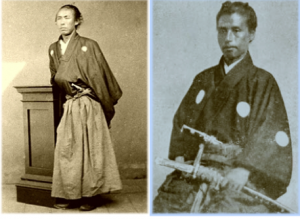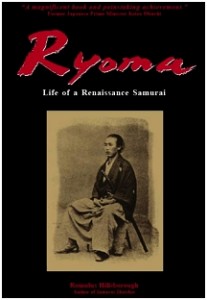“[He] had a cool head, and a certain power about him that was hard to penetrate. He was a good man.” (なんとなく冒しがたい威権があって、よい男だったよ。) (Katsu Kaishu about Sakamoto Ryoma)

Sakamoto Ryoma & Katsu Kaishu
In Part 4 of this series (Nov. 24, 2015), I quoted Sakamoto Ryoma’s assessment of Katsu Kaishu as “the greatest man in Japan.” The respect between the two men was clearly mutual. During the months after the two had first met, Kaishu mentioned Ryoma numerous times in his journal, including in an entry dated Bunkyu 3/5/16 (16th day of the Fifth Month of the Japanese year corresponding to 1863), when Kaishu, then-vice commissioner of the shogun’s navy, wrote that he would send Ryoma to Fukui to solicit financial support for the private school in Kobe which Kaishu was about to establish for the sake of Ryoma and other renegade samurai (ronin) who had enlisted to study under him. In all of these journal entries Kaishu refers to Ryoma, who was twelve years younger than him, as “Ryoma-shi.” The character for “shi” (子), which when pronounced “ko” means “child,” is in this sense used as an honorary and indicates that Kaishu perceived in Ryoma an element of greatness or at least extraordinary ability, as Matsuura Rei explains in his biography of Katsu Kaishu. And in the future, three decades after Ryoma’s death, Kaishu had nothing but praise for him. In an interview with the Yomiuri Shinbun, a national newspaper, given on April 3, 1896, Kaishu said that Ryoma “had a cool head, and a certain power about him that was hard to penetrate. He was a good man.”
Read more about the indispensible relationship between Kaishu and Ryoma in my historical narrative, Samurai Revolution and my biographical novel, Ryoma: Life of a Renaissance Samurai.
For updates about new content, connect with me on Facebook.

Ryoma: Life of a Renaissance Samurai, the only biographical novel about Sakamoto Ryoma in English, is available on Amazon.com.
